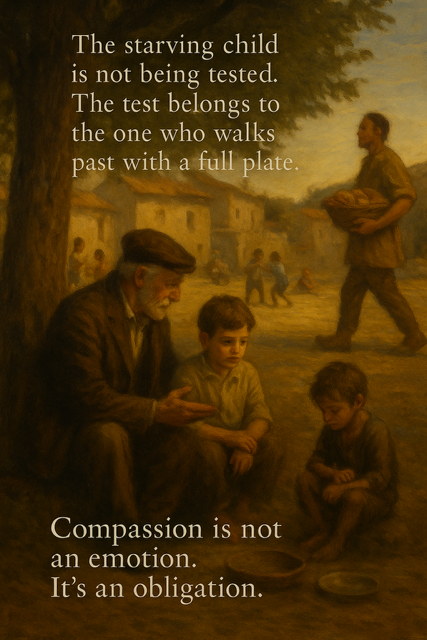
The sky was overcast that afternoon, heavy with the weight of unfallen rain. Emil and his grandfather walked quietly past rows of old photographs in the city’s war memorial museum. Faces of children, families, and soldiers stared back from the walls—some hopeful, others hollow-eyed.
Emil stopped in front of a black-and-white image of a malnourished child clinging to an empty bowl.
His voice cracked. “Grandfather… if God is loving, why design a world where children starve? Why allow a test that cruel?”
Grandfather stepped beside him, folding his hands behind his back. “It’s a question many have asked, Emil. And it deserves more than silence.”
He looked at the photograph with quiet sorrow. “But the test… it isn’t for the starving child.”
Emil turned to him. “What do you mean?”
Grandfather met his gaze. “The test is for those with bread. The ones whose plates are full while others go empty. The ones who sleep in warm homes while bombs fall far away. The ones who can act—but don’t.”
He walked slowly toward the next display—a pile of ration cards from a war-torn country.
“Emil, life’s trials are not always tailored to the sufferer. Sometimes, the pain of one soul is the measuring stick for another’s humanity. In that way, the suffering becomes sacred—it holds up a mirror to the world and asks, Who among you will respond?”
Emil was quiet.
Grandfather continued, “When we see hunger and walk past it, when we hear of war and turn the page, when we know of injustice but say, ‘It’s not my problem’—that is when we fail the test. Not the starving child. Not the oppressed. But us—the ones with something to give, something to say, something to do.”
Emil’s brow furrowed. “But why create a world where that test exists at all?”
“Because,” Grandfather said softly, “without need, there is no giving. Without weakness, there is no mercy. And without injustice, there is no opportunity for justice to shine. The test reveals what we truly value.”
They exited the museum and stepped onto the bustling street. People walked past in every direction—some laughing, some silent, all carrying unseen burdens.
Grandfather stopped Emil under a tree. “Never forget, Emil: Compassion is not an emotion. It’s an obligation. God doesn’t ask us to stop every storm. But He does ask—Did you offer shelter to even one person drenched in its rain?”
Emil looked down at his own hands. “So the test… is always close. Closer than we think.”
Grandfather nodded. “Always. And sometimes, it comes disguised as a face in the crowd, an envelope we ignore, a meal we could have shared.”
Emil stood quietly, letting the rain begin to fall on his shoulders.
And for the first time, he didn’t try to run from it.

